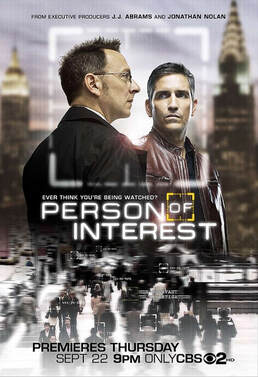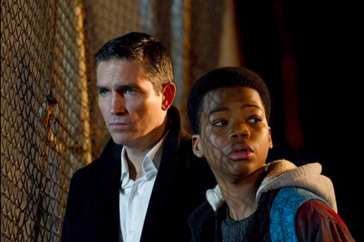
Yes, I can indeed confirm that this week, I have broken the sacred rules of the Faith & Film Blog in choosing to dive into a single episode of the long-running, Sci-Fi television show, Person of Interest. However, I can assure you that it was not done so without precedent. You see, whilst my family and I are lovers of cinema, we also enjoy short-form entertainment that’s quick and easy to digest, but occasionally leaves something intellectually stimulating for us to chew on – a criteria met by Person of Interest and then some.
The brainchild of Jonathan Nolan (brother to cinematic favourite Christopher Nolan), Person of Interest is a high-concept television show which artfully transcends its initially simplistic vigilante formula (think The Equalizer but more high-tech), by offering up challenging questions and entering into discussions of an ethical, philosophical and perhaps even spiritual nature…
When described this way, you’d be forgiven for thinking that the show wasn’t especially ‘fun’, but Nolan and his creative team never forget to thrill us with countless, nail-biting scenes of hand-to-hand combat, or increasingly ridiculous feats of undercover espionage, too. At its core, however, Person of Interest tracks the adventures of John Reese (Jim Caviezel, The Passion of The Christ) and Harold Finch (Michael Emerson) - an ex-CIA operative and reclusive billionaire computer programmer, respectively. In his days as a software engineer, Finch was contracted by the United States’ government to design, build and implement technology which could detect perpetrators of acts of terrorism, before they carry them out. But with great power, comes great responsibility, and Finch predicted that the government would abuse/misuse his gift to the world. And he was right - for whilst the machine identifies those who pose a serious threat to national security by producing their social security numbers, it can also predict acts of violence committed by or against ordinary people, too. Those included within the latter category are deemed “irrelevant” by the government and cruelly left to their fate. But Finch and Reese can’t ignore the numbers and the subsequent crime statistics by simply turning a blind eye to people’s suffering. Instead, the pair team up and take a stand for the helpless, by using their very particular set of skills…
Generally speaking, the show is told in a simple linear structure: the machine alerts Reese and Finch to a new ‘person of interest’, the pair then investigate to determine whether they are the victim or perpetrator (easier said than done in their case), which is then closely followed by a pulse-pounding finale in which justice is neatly served with effortless cool. Such a format, whilst ultimately satisfying, could easily become tiresome, which is why Nolan intersperses the narrative with flashbacks containing information which is pivotal to the current plot, or that which develops the principal characters further. In the case of the flashbacks spread throughout “No Good Deed”, however, they serve to illuminate the show’s mantra: everyone is relevant, and everyone is worth saving.
The episode’s primary plot is Finch and Reese’s tailing of a spy who is currently working for the NSA and targeted for elimination. But when the spy is revealed to be coming dangerously close to discovering the Machine, it causes Finch to consider his relationship to this dangerous creation, and his once misjudged approach to the ethical implications of the work himself and his business partner, Nathan Ingram (Brett Cullen), were about to embark upon:
Ingram: (about the Machine) “Thought you would have turned this thing off by now. We turn it over (to the government) tomorrow”.
Finch: “I'm keeping it online as long as possible”.
Ingram: “The world has been spinning for 5 billion years without your machine, Harold. I'm sure it will be fine for one more night. Honestly, I'll be glad to be rid of the thing.”
Finch: “This ‘thing’ has already saved countless lives”.
Ingram: “You mean countless, relevant lives”.
Finch: “We had to draw the line somewhere”.
Ingram: “Everyone is relevant to someone”.
Even though we might not deserve God’s saving embrace or ever respond to it, Jesus still took upon himself all of our sin (the mistakes you and I have all made in God’s eyes) and destroyed its power forever, thereby making a way for us to be able to choose forgiveness, His all-embracing love and to be in friendship with Him and His Father, if we ask for it. This wasn’t completed just because He could, but because He loves us more than we can ever know. After all, a loving father would do anything to save their children from danger, wouldn’t he? And God saw that we were in dire need of being liberated – from the weight and shame of our mistakes which so often weighs us down, but also the unavoidable reality of eternal death itself. For Jesus himself once said, “unless you believe that I am who I claim to be (the Son of God), you will die in your sins” (John 8:24, NLT), and thereby become doomed to spend eternity in separation from God. But if you and I choose to follow God for the rest of our life, abandoning our wrongdoing, and “openly declare that Jesus is Lord and believe in your heart that God raised him from the dead”, “you will be saved” (Romans 10:9, NLT). And that’s something we can trust in completely, because Jesus has already taken the punishment which we deserved because of our sins, when He died in our place all those years ago. Today, we need only ask for the forgiveness of our sins and walk into friendship and freedom with Him.
So, whilst we read and know that God’s plan of salvation is perfect and ever dependable, we learn that Reese and Finch are often forced to accept that even they have limitations and sometimes fail to save those whom they care about. People die, and there’s nothing they can do about it. Even with the machine working at full force, they cannot account for stray bullets, or those who are perishing in other countries besides theirs. Yes, they might manage to save a large number of people, physically speaking, but they can’t save many or any, quite like God can, in the spiritual sense. For God tends to the evil, sick, wounded conditions of our hearts – Reese and Finch, however, can only tend to our physical wounds. Person of Interest does serve a great purpose though, in that it illuminates the truth that God deems all of us relevant and important enough to be saved, for whilst the scope of those who can be saved in this (albeit entertaining show) is limited by our defined realms of possibility, God is not limited by anything or anyone – salvation is made available to all worldwide, through Jesus, and so there is good reason for Christians to pray for those who do not yet know Him. And whilst Person of Interest and its central conceit is a work of fiction, we can tell others that God’s unwavering desire to love and save others, isn’t – for we can tell them, because of Jesus, “today is the day of salvation” (2 Corinthians 6:2, NLT).
Challenge:
Why not prayerfully invite a friend or family member who doesn’t yet know Jesus, to watch Person of Interest? Use the TV show’s themes to ask them what they thought of the film, if they spotted any links to Christianity and what they might think of the Gospel’s response to this subject.
If you feel able to, ask them what they think about this episode and it’s view on people’s intrinsic sense of worth and value. Are all people worth saving? Should Jon and Finch save everyone? Ask them what they think about the line “everyone is relevant to someone” – do they agree or disagree? Do they consider themselves to be relevant or important to someone? What about to God? If they answer yes or no, on either question, ask why.
Go on to discuss the lifesaving, life-changing gift of salvation which is made available to all. Say that God, through the sacrifice of Jesus on the Cross, showed His great love for us, by making a way for anyone to choose to be saved from eternal destruction when they ask for forgiveness and turn from their mistakes. Emphasise that God is merciful, because we do not deserve to be forgiven and saved. But through sending Jesus to die for you, He lets us know that we are worth saving.
Now take the opportunity to share the hope of the Gospel message with them - then invite them (if you feel prompted to by God) to consider accepting Jesus into their life today.
Prior to watching the episode (or entire season) for yourself, however, take a moment to pray that God would speak to you through the film. If you feel comfortable, pray this prayer over all of your future, film or TV-watching experiences:
Dear Lord, as I watch this TV show, I ask that you would be present here with me. Highlight to me anything within it that is honourable, anything that can be used in conversation for your Kingdom purposes. Amen.
Person of Interest – Season One, including the episode “No Good Deed”, is currently available to purchase through Amazon Prime Video.



 RSS Feed
RSS Feed